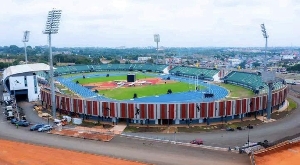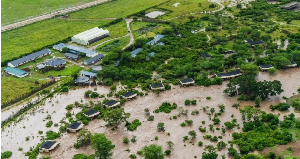- Home - News
- TWI News | TV
- Polls
- Year In Review
- News Archive
- Crime & Punishment
- Politics
- Regional
- Editorial
- Health
- Ghanaians Abroad
- Tabloid
- Africa
- Religion
- Election 2020
- Coronavirus
- News Videos | TV
- Photo Archives
- News Headlines
- Press Release
General News of Tuesday, 22 April 2003
Source: Network Herald
"Chop Small Small" - Panelists appeal to Politicians
Military Intelligent Experts have caution politicians over exhibition of luxury in the mist of poverty. They said "politicians who entered government and parliament with virtually nothing only to starts showing off after a few months in posh cars and expensive lifestyles only confirm perceptions that they enter politics to enrich themselves to the detriment of the ordinary person".
The Officers who included both servicing and retired soldiers and diplomats stated this when contributing toa round table discussion organized by the African Security Dialogue and Research (ASRD) recently in Accra. They said such life style sends the wrong signal to their counterparts especially those in the security and other services whose incomes and renumerations are very poor that politics is a lucreative venture. The Military Officers therefore advised political office holders and government appointees "to chop small in the interest of national security."
Speaking on the topic "Developing ECOWAS Rapid Reaction Capability in the west Africa sub-region," Brigadier Francis A. Agyemfra (rtd), a former top notch of the Ghana Army described the sub-region as the most volatile on the African continent. He said the brutal ten year civil war in Sierra Leone, the separatist struggles in the Cassamance province which still threaten the territorial integrity of Senegal and the resurgence of the Liberian conflict poses great danger to sub-regional integration.
He submitted that the recent turmoil that has lasted almost eight months in la Cote d I'Voire which led to the devision of the country into government and rebel held areas have proved the efficacy of and necessity for collective action in the maintaince of peace and stability in the sub-region. Brig Agyemfra lamented that despite past accomplishment in handling crisis,the regional body ECOWAS had proved incapable of mobilizing its peace operations quickly to meet crisis situation.
He said the Ivoiran crisis confirms that in spite of the existence of the ECOWAS Mechanism for Conflict Prevention, Management, Resolution, Peace-keeping and Security sub-regional leaders still lacks the manpower to rapidly responses to crisis. He said "a response to a crisis of the order of the Ivorian situation, sparked by a few disgruntled soldiers, must be swift, within hours and days, like the French intervention, not months, if the response is to effective."
"Had ECOWAS been able to demonstrate a robust military presence in Cote d'IVoire to buttress the October 17th cease-fire immediately after the agreement had been concluded, it is quite possible that the scale of the conflict would not have widened, and perhaps, it would have been unnecessary for President Gbagbo to have engaged the services of mercenaries," Brig Agyemfra said.
He therefore called for a rapid response force with the ability to acquire, analyse aanalyses timely decisions based on early-warning data from a wide variety of sources with organisatorganizationalty to prepare generic plans, including provision of transportation and logistic support advance of a crisis.
Other capability, he said should include the ability to undertake concurrent activities, such as allowing implementation actions to be initiated at early stages of the decision-making process and to deploy the minimum necessary operational-level command and control facilities to a theatre of operations within seven days.
And with the capability to deploy a force of sufsufficentze to deal with the immediate stages of an emergency within an additional three to five weeks. Brig Agyemfra said "it is time West African states acknowledged that an effective rapid reaction capability could curb the political instability which denies the sub-region as whole the opportunities to attract foreign investment and development.
"The need for sub-regional rapid development capability should also be seen as an attempt to blunt neo-colonial tendencies in the management and resolution of African conflicts. "Certainly, foreign interventions in conflicts in Africa do not serve the best interests of Africans, since the foreign powers naturally tend to promote their own interests rather than those of the countries in which they intervene."










